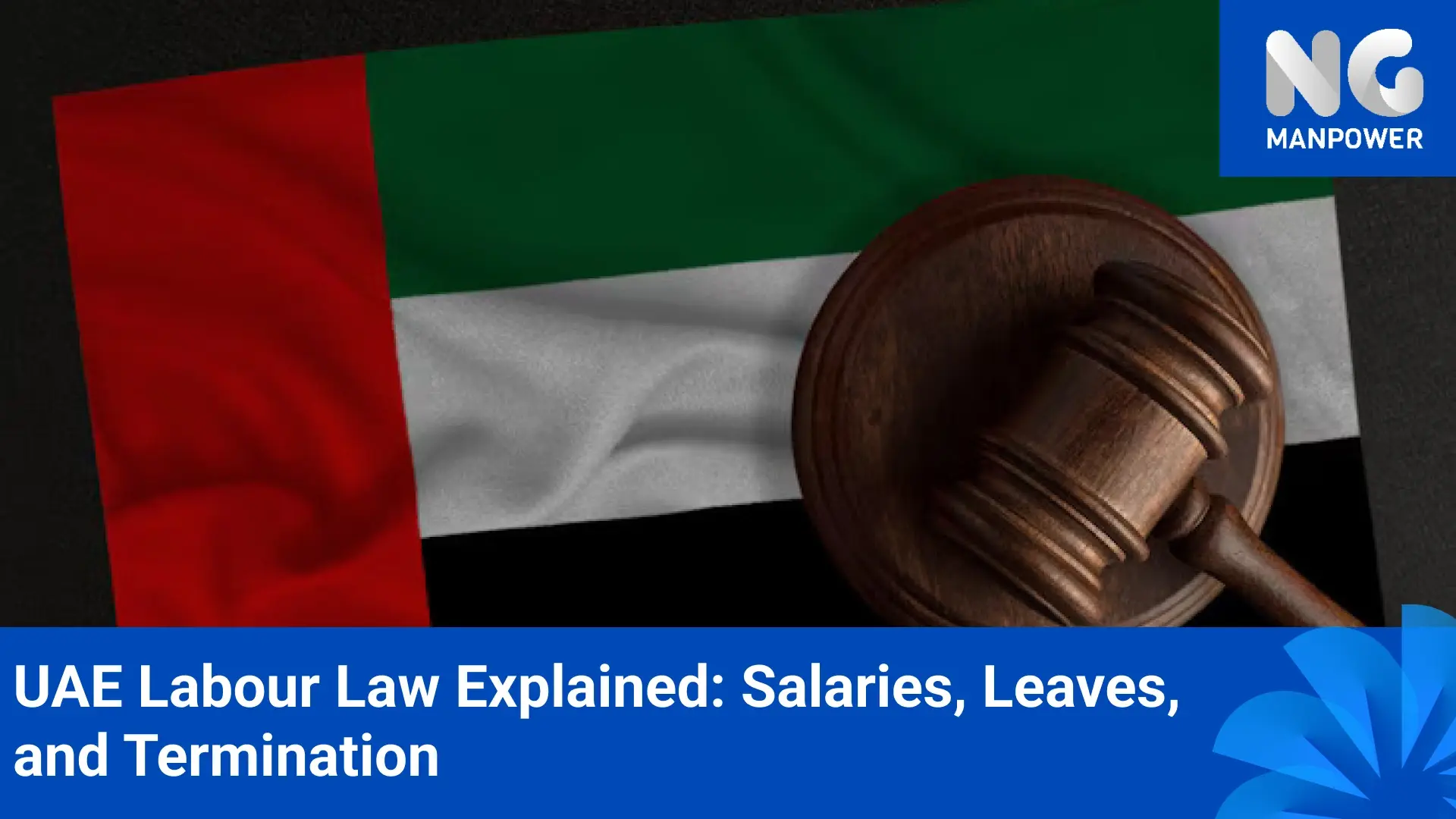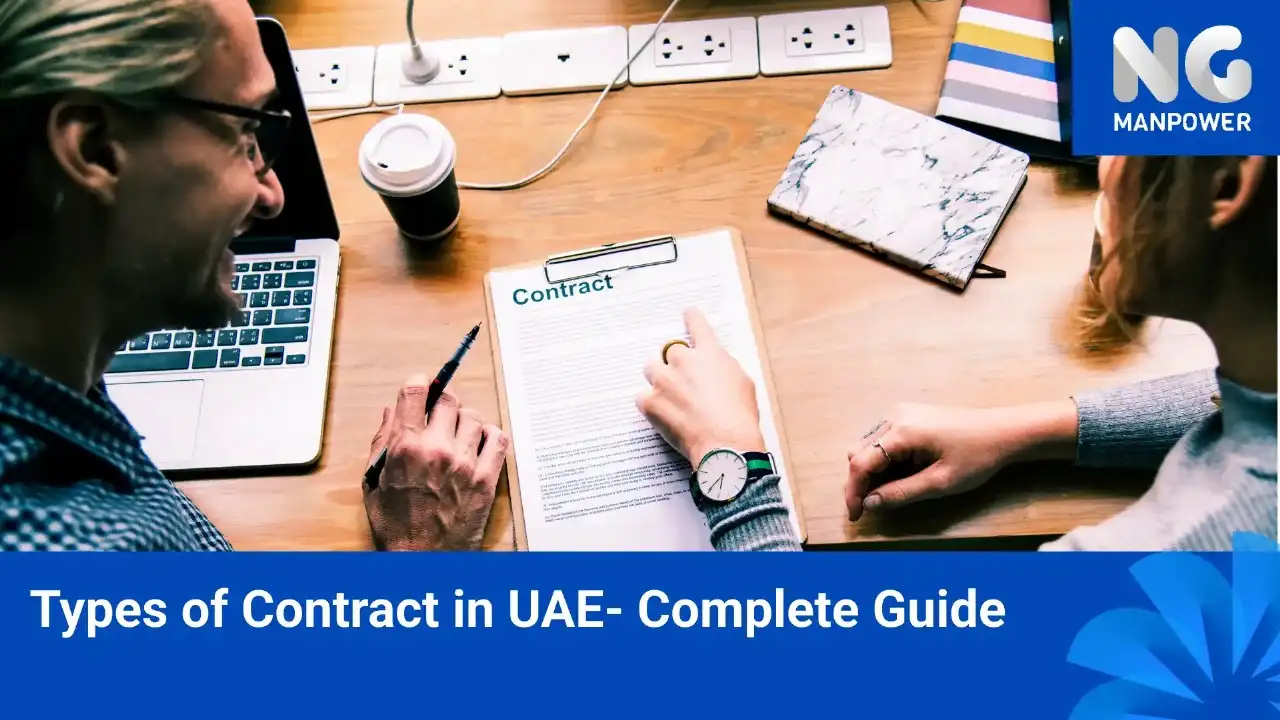If you’re an expatriate worker, you should be aware of UAE wages, your leave entitlements, and the basis for termination. Similarly, a business owner also requires a deep understanding of how much to pay their employees, the number and types of leaves granted to their workers, and their rights to terminate employees. Knowing these rules achieves smoother workplace relationships and fewer legal hiccups. The new UAE Labour Law 2025 introduces several updates that impact salaries, leaves, and contract termination. Staying updated on labour regulations is essential for employers and employees.
In this blog post, we shed light on the latest updates and key elements that define the UAE’s work environment in 2025.
 Overview of UAE Labour Law 2025
Overview of UAE Labour Law 2025
The UAE Labour Law 2025 continues to focus on fairness. Following the laws leads to flexibility and transparency in employer-employee relations. Understanding these labour laws achieves greater clarity on contract terms and renewals. Guaranteeing clearer rights for employees in cases of termination.
The UAE labour laws emphasize minimum wages and timely payments. Employees can have broader categories for leaves. Including sick, maternity, paternity, and study leave. Adhering to UAE labour laws provides stronger protection for employers and employees in dispute situations.
Key updates in 2025 include:
- Clarity on minimum wages
- Expansion of parental leave
- Stricter penalties for salary delays
- The clearer the termination guidelines clearer
Types of Employment Contracts in the UAE
In 2025, all employment contracts in the UAE will fall into two main categories. The two types of contract are:
- Limited Contract
- Unlimited Contract
Limited Contract
The limited contract has a fixed start and end date. The contract automatically ends upon expiry unless renewed. These types of contracts are often used for project-based or short-term employment.
Unlimited Contract
The unlimited contract has no defined end date. The contract offers more flexibility for both parties. These contract types are more commonly used in long-term employment.
Limited Contract vs Unlimited Contract in UAE
Understanding the differences between these contract types is pivotal:
|
Feature |
Limited Contract | Unlimited Contract |
|
Duration |
Fixed |
Open-ended |
|
Termination Notice |
Must follow contract terms |
Flexible with a notice period |
| Calculated by term length |
Based on the full employment span |
|
| Common Use | Short-term/project roles |
Permanent positions |
Article 43 UAE Labour Law – Contract Duration and Renewal
Article 43 UAE Labour Law outlines the procedures for terminating a work contract. Either the employee or the employer can end the contract. However, they are required to provide a written notice of 1 to 3 months. It depends on what the contract says. Both sides can agree to shorten or skip the notice period in the UAE.
The worker must get full pay during this time. They can take one unpaid day off each week to look for a new job. In case of finding a new job, inform the employer three days before.
Article 44 UAE Labour Law – Termination Without Notice
Article 44 UAE labour law protects employers from gross misconduct by allowing them to terminate an employee without advance notice in specific situations:
Grounds for Immediate Termination:
- Submission of false documents or identity fraud
- Violating workplace safety or confidentiality rules
- Physical assault or serious misconduct
- Repeated failure to perform duties after warnings
Employers must document incidents clearly, and employees retain the right to appeal unfair dismissal through legal channels.
Salaries and Minimum Wage in UAE (2025 Update)
For the first time, the UAE has introduced a structured minimum wage system as part of the 2025 update. The workers must understand the UAE wage as per the labour law. It helps them to identify the actual wage that they deserve based on their education, experience, and skill set.
Minimum Wage in UAE According to Labour Law 2025
The United Arab Emirates doesn’t have a minimum wage by law. The UAE Labour Law stipulates that wages should be sufficient to cover basic needs. The employees have been given a fair chance to negotiate their salaries within employment contracts.
There’s no fixed minimum; industry standards suggest salary ranges, such as:
- Skilled laborer’s earn between AED 5,000 to AED 7,000 pm
- A bachelor’s degree or higher could expect AED 12,000
Article 29 UAE Labour Law – Wage Payment Regulations
Article 29 UAE Labour Law focuses on annual leave entitlements. Specifically designed for private sector employees. The employees can avail of 30 days of paid annual leave after one year of service. The law also provides leave for employees with less than a year of service. Workers under this category can get two days’ leave per month.
Salary Protection and Penalties for Non-Payment
If a company in the UAE pays salaries late or doesn’t pay at all, it can face strict penalties. These include fines, blocked work permits, and legal trouble. The punishment depends on how big the company is and how long the payment is delayed.
Here’s an easy breakdown:
Large Companies (over 100 employees):
- 10 Days Late: The Government may stop issuing work permits.
- 1 Month Unpaid: The Company can face fines, a lower company rating, and workers may switch jobs.
- Over 60 Days Unpaid: Fines can go up to Dh50,000.
Small Companies (less than 100 employees):
- Over 60 Days Unpaid: Work permits may be blocked, fines applied, and the case could go to court.
Working Hours and Overtime Under UAE Labour Law
The standard working hours are 8 per day or 48 hours per week in the UAE. The workers can get overtime pay at a rate of 1.25 times the normal hourly wage. The UAE workers will receive their regular salaries plus 25% for each overtime hour worked.
Working Hours in UAE: What Changed in 2025?
The working hours in the UAE remained the same in 2025. The UAE labour stipulates some changes in timings in Ramadan. These hours are reduced by two hours per day.
Overtime Pay and Legal Limitations
UAE workers must be paid extra if they work more than their regular hours. They get 125% of their pay for normal overtime and 150% for late-night or holiday work. Further, overtime can’t go over 2 hours a day unless there’s an emergency.
Types of Leave Under UAE Labour Law 2025
Understanding the types of leaves is mandatory for workers working in the UAE. We have discussed them one by one separately for better understanding. For instance, the UAE allows workers to take leave when needed, such as:
- Annual Leaves
- Sick Leaves
- Paternity Leave
- Compassionate Leaves
Annual Leave in UAE: Entitlements and Accrual
The workers can get 30 days of paid annual leave in the UAE after working for one full year. Even, they earn two days off for each month if they’ve worked more than six months but less than a year. This adds up to 24 days annually.
Sick Leave in UAE: Duration and Documentation
Private sector workers can take 90 days of sick leave in the UAE annually. The first 15 days are fully paid. The next 30 days are half-paid, and the last 45 days are unpaid. Employees are required to inform their employer within three days. Show a medical certificate if needed.
Paternity Leave in UAE: New Provisions in Labour Law
The new fathers get five paid days off as paternity leave in the UAE. They must use this leave within six months after the baby is born. This makes the UAE one of the first in the region to support dads with official time off.
Compassionate Leave in UAE: What Employees Should Know
The UAE workers can take paid leave if a close family member passes away. They get 5 days off for the death of a spouse. They get 3 days off for a parent, child, sibling, grandchild, or grandparent loss. These leaves are called compassionate leave in the UAE.
Notice Period and Termination Rules in UAE 2025
Both employees and employers should know the notice period and termination rules as per the UAE labour law. Understanding the rule can give employers an edge in knowing their rights. Similarly, providing employees a chance to respond if something goes wrong happens to them.
Notice Period in UAE: Employee vs Employer Obligations
A 30-day notice is required when ending a job under an unlimited contract. This notice period can be up to 90 days as per the contract. A penalty should be paid if either side doesn’t follow the notice rules.
Article 45 UAE Labour Law – Immediate Termination Grounds
In some cases, Article 45 UAE Labour Law lets employees quit without giving notice. This includes:
- If the employer breaks the contract
- Doesn’t follow the law, or
- If the worker is harassed or given new duties without agreeing.
In short, this article helps protect workers’ rights.
Article 120 UAE Labour Law – Serious Misconduct and Termination
Article 120 UAE Labour Law lets employers fire a worker without notice if they do something seriously wrong. This includes:
- Lying about who they are
- Causing big money losses
- Breaking safety rules, or
- Sharing company secrets.
It also covers being drunk at work, fighting, or breaking rules, even after warnings.
Employee Rights and Benefits Under UAE Labour Law
The UAE labour law has been very kind to its workers. That means it grants all the rights and benefits to their workers. The workers in the UAE always feel motivated and valued at work. All thanks to the UAE government for the labour laws they introduced.
Manpower Employee Benefits: Legal Requirements in UAE
UAE manpower employee benefits are protected by Labour Law No. 33 of 2021. Workers must get things like:
- Health insurance
- End-of-service pay
- Yearly leave
- Sick leave, and
- Safety at work.
The law also gives time off for new mothers and fathers.
End of Service Gratuity: How It’s Calculated Under the 2025 Law
The UAE workers get end-of-service pay based on their basic salary. It is also based on how long they’ve worked. For the first 5 years, they earn 21 days’ salary for each year. After 5 years, they get 30 days’ salary for every extra year.
Gratuity Calculation:
If someone worked for 8 years and had a basic salary of AED 5,000, their end-of-service gratuity in the UAE would be calculated like this:
- First 5 years:
21 days’ salary per year
→ 5 years × 21 days = 105 days - After 5 years (last 3 years):
30 days’ salary per year
→ 3 years × 30 days = 90 days - Total days:
105 days + 90 days = 195 days - Daily salary:
AED 5,000 ÷ 30 = AED 166.67 - Total gratuity:
195 × AED 166.67 = AED 32,500.65 - Final Gratuity = AED 32,500.65
This amount assumes the employee completed their service properly and was not terminated for misconduct.
Health Insurance and Other Employee Benefits
Employee benefits are an important part of a worker’s overall pay. These extras help companies keep and attract good employees. Health insurance is one of the most common and valued benefits offered. Other employee benefits, like paid time off PTO and retirement savings plan also provided to workers. The purpose of granting these facilities is to attract and retain top talent.
Manpower Supply and Compliance with UAE Labour Law
UAE manpower supply companies must follow labour laws. This helps them to protect workers’ rights and meet employer responsibilities. This includes:
- Handling visas.
- Paying wages on time.
- Keeping work conditions safe.
Not following the rules leads to fines, legal trouble, and damage to their reputation.
Manpower in UAE: Legal Framework and Licensing
Manpower supply companies in the UAE need special licenses to operate legally. They must get a trade license from the DED. A license from MOHRE is also required to hire and provide workers. The MOHRE checks that these companies follow all labour laws before giving approval.
Manpower Supply in Sharjah: Local Labour Law Compliance
Manpower supply in Sharjah must follow the UAE Labour Law. Adhering to laws gives them the right to operate legally and ethically. This means:
- Hiring workers with valid visas and official contracts
- Paying salaries on time through the WPS
- Providing employee benefits
- Guaranteeing fair employee treatment
Manpower Supply in Abu Dhabi: Employer Obligations
Companies that hire workers through manpower supply in Abu Dhabi must follow labour laws. They handle hiring, visas, salaries, and work conditions fairly. Employers also need to follow the right steps when ending a worker’s job.
Final Thoughts
The UAE is a region full of possibilities and opportunities for both employees and employers alike. From protecting workers in terms of wages to offering rights to employers to fire and terminate an employee in case of misconduct. Thus, there is a labour law available for every situation.
The credit goes to the UAE government, which wants to give optimum benefits to both parties. These UAE labour laws promote transparency and fairness in the employee-employer relationship.
if you’re on a hunt to get help with any employment or business issue, don’t forget to contact us! Ng Manpower never disappoints when it comes to assistance.
FAQs
What is the UAE Labour Law? And who does it apply to?
The UAE labour law governs employment relationships for private-sector employers and employees across the UAE.
What rights do employees have under the UAE Labour Law?
Under the UAE labour law, workers enjoy fair wages, contracts, leave entitlements, safe workplaces, and end-of-service benefits.
What are the rules for termination and notice period in the UAE?
Notice ranges from fourteen to ninety days unless termination falls under Articles 44 or 45.
How is gratuity calculated under the UAE Labour Law?
Gratuity is calculated based on the last basic salary and years of service. It excludes allowances.
What are the official working hour rules in the UAE?
The official working hours are eight hours daily, forty-eight hours weekly, and reduced hours during Ramadan.
What penalties apply for violating the UAE Labour Law?
Violating the UAE labour law causes fines, work permit bans, licence suspension, and legal claims through MOHRE.


 Overview of UAE Labour Law 2025
Overview of UAE Labour Law 2025

